Rat poisons are killing New England eagles and owls. How you can help save them

Zak Mertz has responded to hundreds of bird injuries and deaths over the years. But he often thinks about one in particular, when a great horned owl was found dead at the bottom of a tree last year.
In tending to the raptor, Mertz and his staff from the Birdsey Cape Wildlife Center in Barnstable, Massachusetts discovered a second parent and baby remained in the nearby nest.
Within days, the other parent had fallen from the tree "essentially comatose," said Mertz, "bleeding out of the eyes, nose, mouth."
Both parents had perished from rodenticide poisoning, specifically second-generation anticoagulant rodenticides, known as SGARs. The baby was poisoned, too, and he stayed in the care of the Cape Cod wildlife hospital for almost 230 days before being released back into the wild – after losing his entire family.
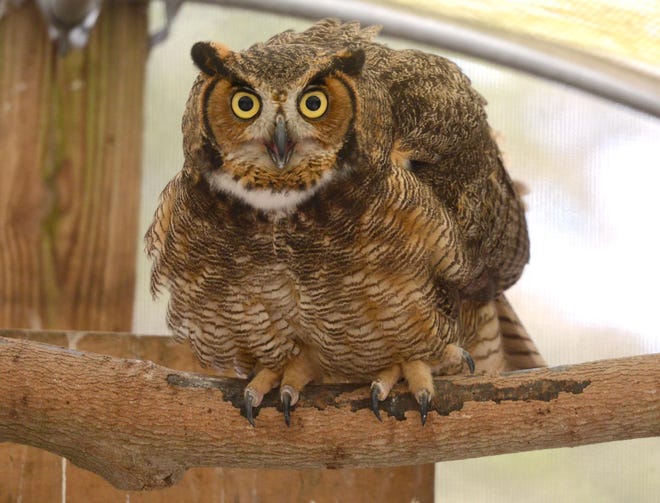
Fighting for life:Rescued baby owl gets emergency care after family dies from rat poison
"It's awful," Mertz said of rodenticide poisoning, "it's prolific. We're seeing it so frequently."
Rodenticide poisoning killing birds of prey
Anticoagulant rodenticides can be deadly to birds of prey and ultimately any animal that eats rats or mice exposed to the chemicals. They're seen on virtually every street corner in the form of nondescript black bait boxes, in both urban and suburban areas.
Long recovery:Great horned owl returns to wild on Cape Cod after rodent poisoning
SGARs can't be sold for individual consumer use, per Environmental Protection Agency restrictions, but licensed pest professionals and agricultural users are permitted to use them, and often do. The chemicals can also be purchased online in commercial use quantities.

"They're the really pernicious ones that are really widespread," Mertz said. "They're the ones we see the effects of every single day in our hospital."
Unsuspecting wildlife are experiencing rodenticide poisoning anywhere humans are trying to control rodents – because where the rodents are, there are predators who feed on them. When an owl or hawk eats a rodent that's been poisoned, it can lead to bruising, bleeding, lethargy and oftentimes death.

The use of rodenticides has been widely debated over the years. Proponents of rodenticides often contend the chemicals are key in controlling the diseases rodents carry, as well as the damage they cause. Wildlife advocates have pushed for less harmful methods to control rodents, to preserve the animals who are indirectly harmed. Cases of poisoning in people and pets have occurred as well, prompting the EPA to cut off retail sales in 2015.
Snowy owls:Beloved birds giving Rhode Islanders many photo opportunities this year
"I think there is a wide appreciation for raptors," said Mariah Beck, chief veterinarian at the Wildlife Clinic of Rhode Island. "People really appreciate their beauty and strength and can connect with them. Think about their suffering and their right to a healthy life and untarnished life."
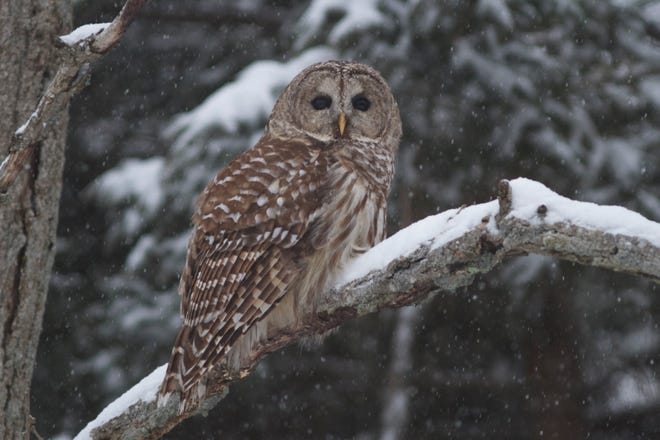
Wildlife rehabbers often begin treating for rodenticide poisoning right away based on symptoms, Mertz said, because diagnosing it clinically requires a laboratory test. For that reason, it's hard to get a full picture of just how many animals are affected each year.
Published in 2020, a study by the Tufts Wildlife Clinic tested a sample of more than 40 Massachusetts red-tailed hawks, revealing 100% of them were positive for anticoagulant rodenticides.
Last May, MassWildlife officials announced the state's first documented case of a bald eagle dying from rodenticide poisoning. A few months later, a second one died.
'People need to see' the harm done to raptors
In Epping, New Hampshire, raptor rehabilitator and educator Jane Kelly has been sounding the alarm on Facebook and Instagram all winter long about rodenticide poisoning, encouraging people to write to their legislators. Her organization, On the Wing, has been flooded with sick owls and hawks.
In posting a recent video of a weakened female barred owl, Kelly wrote, "People need to see. Unfortunately we didn't get to this one in time and she passed overnight. Hemorrhaging and seizures are just two of the painful ways that rodenticide poisoning kills. We take pause to apologize to this owl, and vow to keep fighting."
Lead poisoning in birds of prey
In addition to the threat of rodenticide, the nation's bald eagles are showing signs of widespread lead poisoning, according to a February study published in the journal Science. Forty-six percent of bald eagles tested in 38 states had chronic lead poisoning, the study found.
Lead poisoning in raptors often occurs when they scavenge remains of animals shot with lead ammunition, or consume other types of outdoor sporting equipment made with lead.

"We see lead poisoning almost at the same rate as rodenticide poisoning," said Mertz, noting water foul species frequently ingest fishing sinkers and, as a result, are common intakes at their hospital on Cape Cod, which is affiliated with the New England Wildlife Center based in Weymouth.
Beck, of the Wildlife Clinic of Rhode Island, said lead poisoning cases are much easier to diagnose than rodenticide. Her facility has a lead tester on site, with results back in 90 seconds.
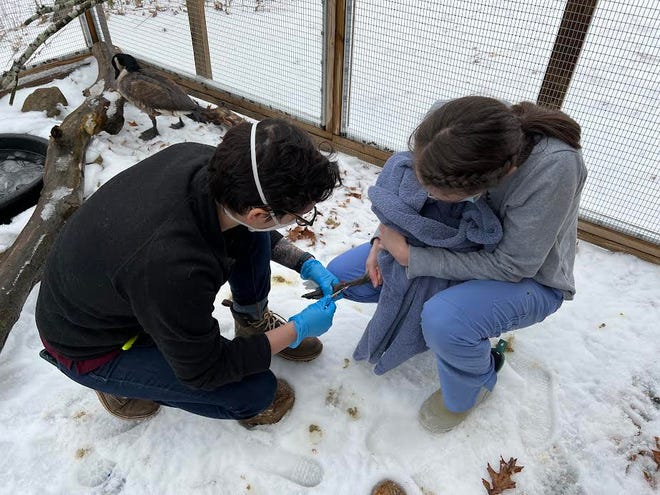
Rodenticide poisoning can be "quite shocking" visually in terms of blood loss, Beck said. Meanwhile, lead poisoning shows itself with neurologic symptoms, overall weakness, emaciation and paralysis of the legs.
"Hunting and fishing gear are the biggest culprits," she said.
With uptick in accidental poisoning,wildlife experts urge caution with rodenticide
Some hunters have switched entirely to copper bullets for this very reason, as copper doesn't fragment into tiny pieces and isn't as toxic as lead.
Many animals live with levels of lead and rodenticide in their systems, studies show. They're most threatened when the contaminants reach a stage of toxicity.
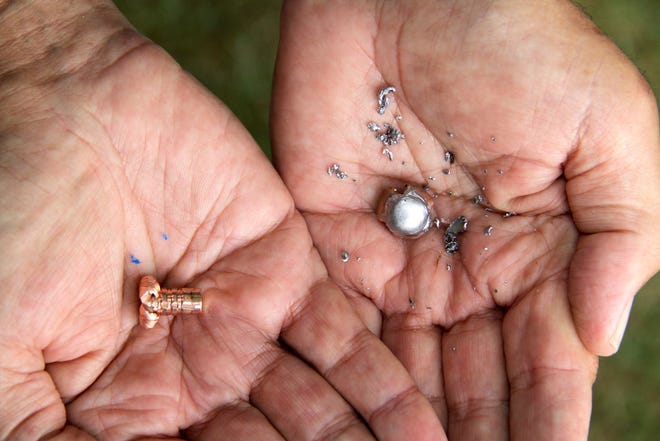
A January study in the Journal of Wildlife Management – looking at 1,232 bald eagle deaths in Connecticut, Massachusetts, Maine, New Hampshire, New Jersey, New York and Vermont – suggests that lead poisoning could have negative impacts on species resilience and population growth over the long-term.
Just 40 years ago, bald eagles were close to extinction in the U.S., but have quadrupled over the last decade as a result of federal protections and conservation programs.
In 2013,California was first state to ban lead ammunition
"(Bald eagles are) our national symbol," said Gary Menin, a bird advocate in Sterling, Massachusetts and former director of the state's Raptors Are the Solution chapter. "If anyone shot one of these birds, they’d end up in federal prison. And that’s a far more humane death than these rat poisons."
What are alternatives to rodenticides?
Rodents inside homes and businesses are a public health issue, especially in certain urban areas and communities on the water.
The National Pest Management Association, a nonprofit trade group representing the industry, takes the stance that rodenticides are "invaluable," calling the chemicals "one of the most important tools that pest management professionals employ to reduce and eliminate rodent populations that can negatively impact public health through the transmission of various dangerous and deadly diseases," according to its website.
A related problem - fishing-line injuries:A problem wildlife rescuers are trying to reel in
Many wildlife rescue groups promote rodent control techniques that don't include the use of harsh chemicals that may inadvertently kill other animals.
"We are completely, completely reliant on the stability of the natural earth and planet for our existence here," said Beck. "Every one of us has to do our part and support that in whatever way we can. There are a lot of safe and effective alternatives for managing rodents."
The EPA touts integrated pest management as an "effective and environmentally sensitive approach" with the "least possible hazard to people, property and the environment."
Mertz described integrated pest management as a combination of preventative maintenance, deterrence and common sense practices. Possible entry points for rodents should be sealed, and attractions like food or water should be properly stored.
This city uses fertility control, other methods to stop rapidly reproducing rats
Though "unpleasant," Mertz said, his organization suggests snap traps for rodent control as a first line of defense.
"It's not a perfect solution, but at least it's targeted," he said. "The only animal affected is the mouse or rat."
The National Pesticide Information Center encourages people to try a combination of control methods before turning to chemicals. "Consider prevention, sanitation and exclusion before using a rodenticide," the center says. "Then try a lower toxicity product first."

Second-generation anticoagulants are more deadly, and can take effect in a rodent after just one feeding. Some rodenticides are less potent, requiring several feedings to set in.
"Every single time we reach a new person, you always get the response, 'Oh my god. Had I known, I would have used a different method,'" said Mertz.
In 2016, three major U.S. cities, including Boston, saw major success when using dry ice to control rodents, but the EPA put a stop to the practice because dry ice wasn't approved as a pesticide. The agency has since registered dry ice products for the use.

Birds of prey are nature's form of rodent control, raptor experts like Mertz are often quick to remind. The average owl eats more than 1,000 mice each year. A Cooper's Hawk, for example, can eat 12% of its body weight in food in one day.
Will Massachusetts pass rodenticide legislation?
In April 2021, Massachusetts state Rep. Jim Hawkins, D-Attleboro, filed legislation to limit the sale of certain rodenticides and increase public education on the topic.
The bill, which promotes integrated pest management, quickly gained support from organizations like Mertz's, as well as the Massachusetts Society for the Prevention of Cruelty to Animals, Mass Audubon and The Humane Society of the United States.
Rats:Poisoning rodents has long-term impact on Worcester wildlife
The bill was last discussed by the state Legislature in December after being referred to the Committee on Environment, Natural Resources and Agriculture.
Hawkins' bill would require pest control companies to disclose their use of SGARs to customers and obtain written consent before using them. It would create a central database for companies to report what and how much of each chemical they're using, and generate more public education programs in Massachusetts about SGARs.
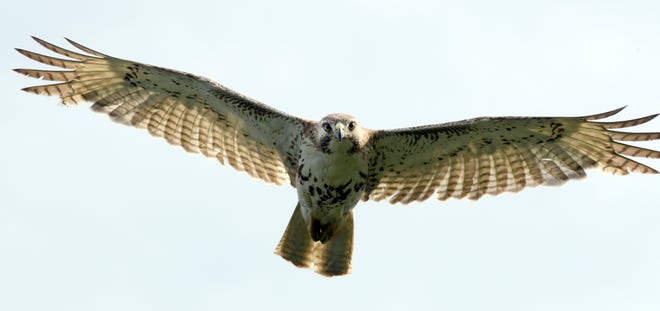
The bill would also mandate integrated pest management practices on publicly owned property.
In 2020, California barred the general use of SGARs until the state could reevaluate them and implement any additional restrictions needed.
Residents take action after bald eagle poisoning death
Voters in the town of Arlington, Massachusetts may soon decide on two warrant articles related to rodenticides if they make it onto the April Town Meeting ballot. Proponents brought the articles forward following the death of a bald eagle in Arlington last year.
Meanwhile, the town is seeing more rodent activity due to mild winters, aging infrastructure and improper waste disposal.
In Michigan:Bizarre rat control hobby turns woman into celebrity among neighbors
In Massachusetts, the power of pesticide regulation lies with the state's Department of Agricultural Resources. Arlington residents expect their efforts to make those decisions locally could merit a challenge from the state.
Menin, who gives presentations about rodenticides around the state at local libraries and Lions Clubs, applauded the efforts in Arlington and hopes other communities will follow suit.
Arlington, MA looks to curb rodenticide use following bald eagle deaths
"If we could do it on a town-by-town basis, that would spread across the state, and hopefully across state boundaries," he said. "It’s about the attitude of the populous to take this by the horns, and get their select board or council on board with this and pass it as their local bylaws. Or even a non-binding resolution, raising awareness in the town."
The National Pest Management Association is currently opposing a legislative effort in Colorado that would allow local governments to ban pesticides and regulate pest control. The association says it would "destroy" their industry by creating a patchwork of regulations, making it difficult for businesses to do their jobs.

No comments:
Post a Comment
Note: Only a member of this blog may post a comment.